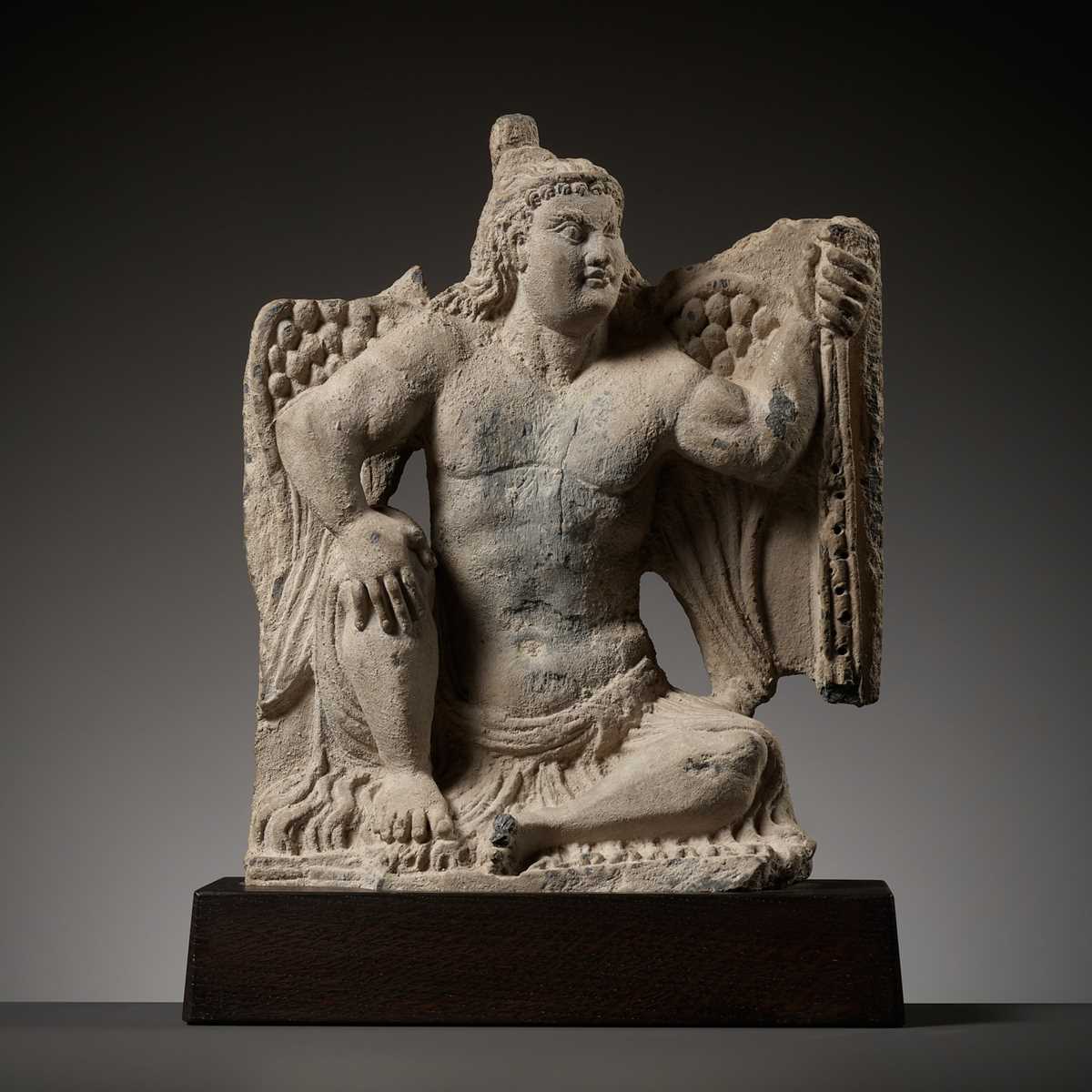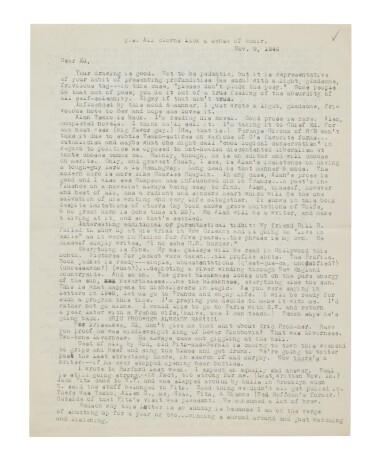Details
KEROUAC, Jack (1922-1969). Typed letter signed (“Jack”) to Ed White, 9 November 1949. Unpublished.
Quarto. Single leaf; both sides; faint paperclip impression; creased. With envelope addressed in type, postmarked Jamaica, New York.
"The secret of Shakespeare is that the sausage-eaters in the first row cannot miss the madness of Lear any more than the noblemen in the boxes can miss the poetry of the speeches. What is, is.”
Jack reflects widely on writing in this letter:
[M]y ideas of art are changing too. Too many books in old bookstores, too many words. From now on every word I write counts, and the lesser the better. [...] I want every line to shine and to be something the reader did not know before. And that I did not know before. Maybe poor Djuna Barnes achieved all this in Nightwood [...]. But not to say that I want to write obscurely. Clearer, simpler than ever, if possible.
Other “tidbits” abound – William Burroughs failed to show up for his trial in New Orleans and is going to “live in exile” in Mexico. The cover of The Town and the City is ready. Midpoint in the letter Jack writes: “I am on the verge of shutting up for a year or two…winding a shroud around and just watching and listening.” These were skills at which Kerouac excelled: watching, listening, and remembering.
Jack writes further that Allan Temko was back from Paris (he later married and returned there to write a distinguished book about Notre Dame) and that he was reading Temko’s novel, and helping him submit it to a publisher. The gravest fault of the book, Jack noted, was Temko’s insistence on having a tough guy hero “á la Hemingway.” Allan having a “radiant and sincere heart” would be “the salvation of his writing and very life altogether,” according to Jack, and he predicted Temko would “be a writer, and make a living at it.” It proved an accurate assessment – in 1990, while writing for the San Francisco Chronicle, Allan Temko was awarded the Pulitzer Prize for his architectural criticism.
In the final paragraph Kerouac comments on his alma mater Columbia. The alumni magazine for 1948 had celebrated the groundbreaking for a new field house at the Columbia Stadium and football practice ground in the Bronx, a ceremony which featured Columbia’s post-war president, Dwight D. Eisenhower “digging up the initial ground where they’re going to pull down the old Manor House at Baker Field for a slick new training house.” “The caption calls it an ‘eyesore,’” Jack notes. He reflects that, in fact, it was “[n]othing of the sort... it was one of the charms of Columbia football, a haunted house under the old trees. We used to rush to it eagerly after scrimmage under the floodlights.” This gives way to a nostalgic musing on his brief career as a young prospective football star, in contrast to that of a student in one of America’s best liberal arts colleges: “[M]y Columbia life was never a Columbia existence, but a ragged tattered madness on its periphery. [...] Columbia football was all right but when I read [Thomas] Merton’s experience there, it pales in comparison.” Jack notes that his editor, Robert Giroux, a Columbia alum himself, “laughs and says I’ll probably get an honorary degree anyhow. But I just missed something there.”
Details
KEROUAC, Jack (1922-1969). Typed letter signed (“Jack”) to Ed White, 9 November 1949. Unpublished.
Quarto. Single leaf; both sides; faint paperclip impression; creased. With envelope addressed in type, postmarked Jamaica, New York.
"The secret of Shakespeare is that the sausage-eaters in the first row cannot miss the madness of Lear any more than the noblemen in the boxes can miss the poetry of the speeches. What is, is.”
Jack reflects widely on writing in this letter:
[M]y ideas of art are changing too. Too many books in old bookstores, too many words. From now on every word I write counts, and the lesser the better. [...] I want every line to shine and to be something the reader did not know before. And that I did not know before. Maybe poor Djuna Barnes achieved all this in Nightwood [...]. But not to say that I want to write obscurely. Clearer, simpler than ever, if possible.
Other “tidbits” abound – William Burroughs failed to show up for his trial in New Orleans and is going to “live in exile” in Mexico. The cover of The Town and the City is ready. Midpoint in the letter Jack writes: “I am on the verge of shutting up for a year or two…winding a shroud around and just watching and listening.” These were skills at which Kerouac excelled: watching, listening, and remembering.
Jack writes further that Allan Temko was back from Paris (he later married and returned there to write a distinguished book about Notre Dame) and that he was reading Temko’s novel, and helping him submit it to a publisher. The gravest fault of the book, Jack noted, was Temko’s insistence on having a tough guy hero “á la Hemingway.” Allan having a “radiant and sincere heart” would be “the salvation of his writing and very life altogether,” according to Jack, and he predicted Temko would “be a writer, and make a living at it.” It proved an accurate assessment – in 1990, while writing for the San Francisco Chronicle, Allan Temko was awarded the Pulitzer Prize for his architectural criticism.
In the final paragraph Kerouac comments on his alma mater Columbia. The alumni magazine for 1948 had celebrated the groundbreaking for a new field house at the Columbia Stadium and football practice ground in the Bronx, a ceremony which featured Columbia’s post-war president, Dwight D. Eisenhower “digging up the initial ground where they’re going to pull down the old Manor House at Baker Field for a slick new training house.” “The caption calls it an ‘eyesore,’” Jack notes. He reflects that, in fact, it was “[n]othing of the sort... it was one of the charms of Columbia football, a haunted house under the old trees. We used to rush to it eagerly after scrimmage under the floodlights.” This gives way to a nostalgic musing on his brief career as a young prospective football star, in contrast to that of a student in one of America’s best liberal arts colleges: “[M]y Columbia life was never a Columbia existence, but a ragged tattered madness on its periphery. [...] Columbia football was all right but when I read [Thomas] Merton’s experience there, it pales in comparison.” Jack notes that his editor, Robert Giroux, a Columbia alum himself, “laughs and says I’ll probably get an honorary degree anyhow. But I just missed something there.”
.jpg)
.jpg)













Testen Sie LotSearch und seine Premium-Features 7 Tage - ohne Kosten!
Lassen Sie sich automatisch über neue Objekte in kommenden Auktionen benachrichtigen.
Suchauftrag anlegen